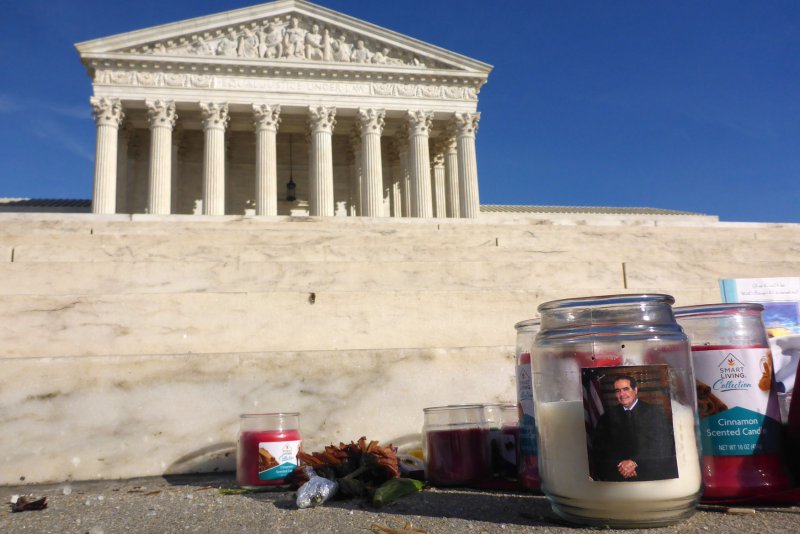A makeshift memorial outside the Supreme Court building on Capitol Hill in Washington, DC. Texas officials are defending the handling of Scalia's sudden death at the remote Cibolo Creek Ranch in Marfa, Texas. Photo by Kevin Dietsch/UPI |
License Photo
WASHINGTON, Feb. 17 (UPI) -- Officials in Texas are speaking out on the handling of the sudden death of Justice Antonin Scalia at a ranch in West Texas in an attempt to put to rest speculation about possible foul play.
Scalia, 79, was found dead on Saturday at the Cibolo Creek Ranch in Marfa, Texas, where he was spending a few days on a hunting trip. He had declined security for the trip, and was not accompanied by any members of his family.
Presidio County Judge Cinderela Guevara was reached by phone on Saturday, and declared Scalia's death was due to natural causes after talking to sheriff's deputies on the scene and to Scalia's physician.
An autopsy was not performed because officials on the scene said there were no signs of foul play and Scalia's family did not request one. A comment made by the owner of the ranch, John Poindexter, on Sunday lit up the Internet.
"We discovered the judge in bed, a pillow over his head. His bed clothes were unwrinkled," Poindexter told the San Antonio Express-News. "He was lying very restfully. It looked like he had not quite awakened from a nap."
Poindexter on Tuesday clarified his remark by stating the pillow was found between Scalia's head and the bed's headboard after many interpreted his remarks as saying the pillow was found over Scalia's face.
During an interview with conservative radio host Michael Savage, Republican front-runner Donald Trump said the death is a "horrible topic, but they say they found a pillow on his face, which is a pretty unusual place to find a pillow."
Savage then said he wanted an investigation into Scalia's death to determine whether it was an assassination.
"This is going to be bigger and bigger and bigger," Savage said. "We need the equivalent of a Warren Commission; we need an immediate autopsy before the body is disposed of."
Radio show host Alex Jones further fueled the conspiracy claims.
"I was the first to come out and say this should be a murder investigation, and they better not not do an autopsy," Jones said on Tuesday. "Then he's found with a pillow over his face."
"You just get used to this, 'Scalia found, it's natural, nothing going on here, he just died naturally,'" Jones added. "And you're like, 'Whoa. Red flag.' Then you realize, Obama is one vote away from being able to ban guns, open the borders and actually have the court engage in its agenda and now Scalia dies. I mean, this is hard core ... If this is an assassination, it signifies that they're dropping the hammer, that's the canary in the coal mine."
Following such comments, Texas officials are attempting to deescalate already heightened tensions surrounding Scalia's death -- particularly by shedding light on how Texas deals with death verification.
"I think everybody did what they were supposed to do," Gene Terry, executive director of the Texas Association of Counties, told The Texas Tribune, adding that a public perception believing autopsies should be performed after every death is unrealistic, costly and unnecessary.
"If you go in a room and there's a body on the floor and there's blood all over the place and a gun on the floor, that's an entirely different situation," Terry said.
In Texas, there are 817 elected justices of the peace allowed, among other duties, to verify the death of someone who didn't die in a hospital or when a doctor can not or will not sign a death certificate.
A justice of the peace can request an autopsy be performed, but there are only 13 medical examiners in Texas' 254 counties to perform the task.
![Justices Scalia, Breyer testify on role of Judiciary in Washington Justices Scalia, Breyer testify on role of Judiciary in Washington]()
File photo by Roger L. Wollenberg/UPI
About 75 percent of Texas' population lives within the urban triangle anchored by Dallas, Austin, San Antonio and Houston -- meaning officials may have to travel for hours to verify a death. Three-fourths of Texas' counties have populations at or under 50,000.
"I think that's something folks outside of Texas don't really get," Thea Whalen, a justice of the peace trainer at Austin's Texas Justice Training Center, said. "It's such a large geographical area."
Bronson Tucker, an attorney for the Texas Justice Court Training Center, said Presidio County officials seemingly followed Texas law in deciding against an autopsy, adding that it was "not completely unusual" for judges to do death inquests by phone -- particularly in West Texas where some judges may have to drive hundreds of miles.
"If you have somebody who's 80 years old, who's overweight, those are all factors," Tucker said. "A lot of times the judges face pressures from their counties because the autopsies are pretty expensive, and especially rural counties don't have a huge budget for things like that."
















